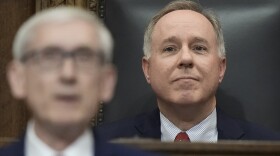School finance can be a tangled web.
The combination of federal, state and local funding formulas that play into classroom budgets is enough to make one's head spin. Nonetheless, the budgeting process is an annual task for school districts.
Leaders and administrators in the Milwaukee Public Schools are in the thick of figuring out their 2018 budget, as the current school year wraps up.
There are a lot of numbers, and a lot of math involved. The budget document itself spans more than 200 pages! But luckily, Milwaukee can rely on the folks at the Public Policy Forum to help paint a picture of what's in store.
In its annual review, Forum experts take a deep-dive into MPS' fiscal plans. President Rob Henken says there's much to be learned from the budget, about the upcoming school year.
"In the case of MPS, so much of their strategic planning [is about] the effort to provide appropriate education services to a student body suffering from extreme poverty and other negative factors - and they have the dual issue of trying to maintain or enhance competitiveness with charter and choice schools," Henken says. "The dollars that are available from year to year have a very big impact on those two important objectives."
Henken breaks down the top takeaways from this year's budget...
1. School operations aren't the priority.
"School operations" covers anything and everything relevant to academic achievement. That fund -- which is one of five within the MPS budget -- covers individual school budgets and classroom spending. Operations priorities make up 79 percent of MPS' total annual budget.
In recent years, the district has been able to invest a good chunk of money into classroom initiatives. But this year, MPS needs to reverse course, Henken says, and generate savings that can be put into items like retirement benefits and debt obligations.
2. Staff reductions will happen.
This time around, less money toward school operations means position cuts. MPS leadership anticipates eliminating 194 positions in the 2018 budget, including 81 teachers and 97 educational assistants.
On it's face, that sounds like a pretty serious reduction. But the good news is the district added 275 positions in the 2017 budget. So the district's total net workforce is still up over the last two years.
District officials have said they anticipate very few layoffs, Henken relays. Most of the 194 positions will fade away through vacancies or retirements.
3. Extra state money won't make much of a difference.
MPS receives its funding through a few different streams: the federal government, the state government, and local property taxes, to name the largest sources.
As the state has increased funding to local school districts, that money has been funneled to districts through per-pupil aid. In his own biennial budget, Gov. Scott Walker has proposed boosting per-pupil aid by $200 extra per student, over the next two years.
Henken says that additional money would certainly benefit MPS: it would add about $15.4 million to the district's budget in 2018 alone. However, it appears other aspects of the state funding formula will remain stagnant -- including preventing MPS from increasing the amount of money they're able to levy through property taxes.
All in all, MPS will actually see a reduction of $12.9 million in state funding.
"Bottom line: still a net increase of about $2.5 million in state aid, but when you think about the fact that the school operations budget is about $930 million, that's a very minimal increase," Henken says.
So, how could all this potentially impact teaching and learning in MPS?
Henken says MPS will certainly have to cut back in 2018 on some sizeable increases they've made to classroom initiatives in recent years. But, he adds, the district is still doing better when it comes to teaching and learning than it was two years ago.
"Despite the fact that there are year-to-year cuts, arguably the budget is still in better shape than it was two years ago, if measured solely on the perspective of how much money is being devoted to schools and to classrooms," he says.
Members of the public are welcome to offer their thoughts on the district's proposed budget at a hearing next week. The Milwaukee School Board has final approval of the district's 2018 budget.






